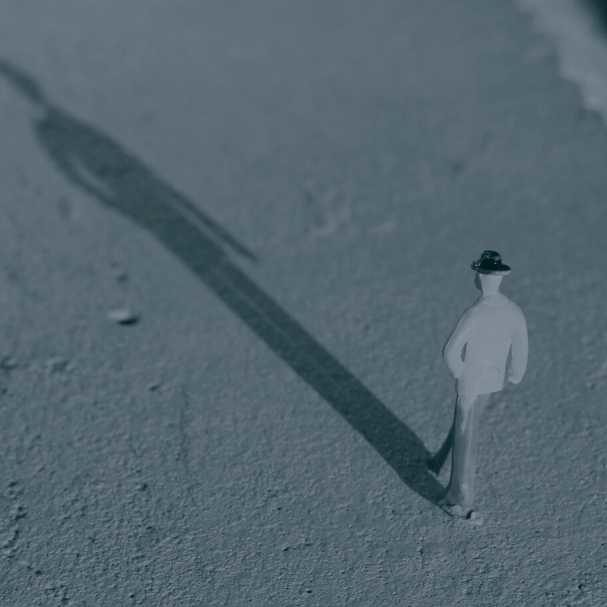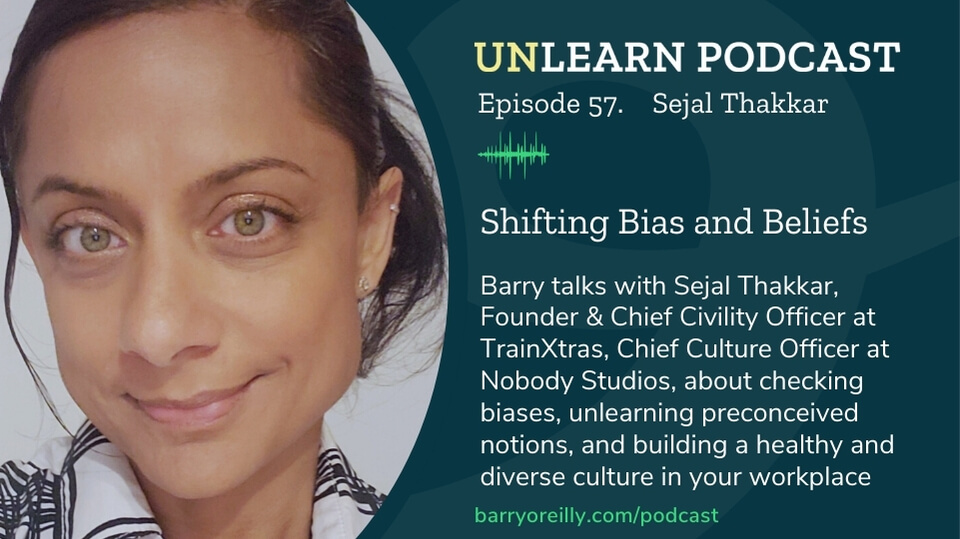Sejal Thakkar is on a mission to educate and empower others to create a world where everyone is treated with dignity and respect. She is a former employment law attorney, a TEDx speaker and the founder and Chief Civility Officer at TrainXtra, where she helps her clients create positive, safe and respectful workplaces through customized training and coaching. She also recently joined Nobody Studios as Chief Culture Officer. Barry O’Reilly welcomes her on this week’s Unlearn Podcast to share her story of unlearning how shifting her own bias and beliefs greatly impacted her life.
Check Your Biases
It’s difficult to acknowledge your biases, because they often portray a vision of you that is opposite of what you believe of yourself. Sejal had to check her own biases in order to do her job as an attorney, representing persons accused of discrimination and harassment. “I had to do a lot of my own inner work to recognize my own bias so that I can do my job, because there’s no way that I can represent people unless I checked my own biases,” she remarks. Our biases often stem from our experiences, and they don’t make us bad people. The key is to slow down and recognize when we’re letting our unconscious biases affect our decisions and use strategies to combat it. She has changed her language: she no longer refers to them as biases, but beliefs. She shares an online tool listeners can use to discover their unconscious beliefs. She also advises leaders to have an accountability partner who will tell them honestly if they’re letting unconscious beliefs influence their decisions. [Listen from 2:20]
What Makes Somebody A Nobody
To truly bring these values to life in our daily work, Nobody’s thesis centers on culture. People first and people matter the most. The company we’re creating is inclusive, collaborative, and focused on collective benefit.


Unlearning Preconceived Notions
Practice active listening, Sejal advises, and you’ll start picking up on your own preconceptions and judgments. Barry reminds listeners that we’re all programmed to have automatic responses in some situations. However, we can reprogram our brains once we become aware of our negative hidden beliefs. He and Sejal discuss their own blind spots and the importance of being humble and willing to learn and grow. “I’ve spent my whole life up to this point learning, and now the rest of life is unlearning,” Sejal comments. It’s about taking small steps in the right direction; eventually “everything else will start to roll”. “The ability to adapt is so powerful,” Barry agrees; “…just do small steps and learn your way through it.” [Listen from 11:25]
(Listen to this podcast on Branding and Blindspots with Margaret Molloy, CMO at Siegel+Gale)
Where Culture Starts
“Your culture starts the moment you hire the first person,” Sejal tells her clients. Building a healthy, respectful and diverse culture means maximizing the skills, talents and contributions of every employee. You have to know what your employees want: ask them and listen to their feedback. “If you’re too afraid to know about what problems are going on, how can you fix them?” she argues. Nurture an environment where people feel safe to speak up, so that you can deal with problems before they become a lawsuit. [Listen from 20:20]
(Read this blog on Putting People Back Into Performance Management)
Psychological Safety
The mark of a culture of psychological safety is that you feel that you can speak up or “call in” actions that are problematic. Sejal says that every employee should be trained how to respectfully interrupt in situations they find offensive. “We want to empower everybody to address those situations right when they’re happening,” she tells Barry. She shares that it’s the bystander’s responsibility to speak up – or “call in” – when they notice something makes someone else uncomfortable. However, this can only happen when everyone understands that we’re trying to make each other better, not shame each other. How you respond when you’re the person that’s called in is also important; try putting aside your initial defensiveness, and see where you might need to do some work to change your behavior. Ultimately, we’re all human and prone to mistakes, Barry and Sejal agree. The important thing is to keep learning and doing better as you learn more. Sejal applauds Barry’s humility. When leaders are humble, they empower their people to acknowledge their own vulnerabilities. Being open to learning from each other is another important aspect of building a culture of psychological safety, she points out. [Listen from 28:20]
Looking Ahead
Sejal is excited about being part of Nobody Studios and helping to build the company culture from the ground up. “The key is that learning is never gonna stop,” she tells Barry, “so I’m excited about the fact that I get to learn about and challenge myself in ways that I never have.” [Listen from 41:20]















